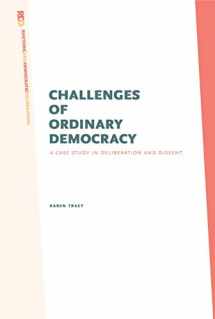
Challenges of Ordinary Democracy: A Case Study in Deliberation and Dissent (Rhetoric and Democratic Deliberation)
Book details
Summary
Description
Is there any place in America where passionate debate plays a more vital role in democratic discourse than local school board meetings? Karen Tracy conducted a thirty-five-month study of the board meetings of the Boulder Valley School District between 1996 and 1999 to analyze just how democracy operates in practice. In Challenges of Ordinary Democracy, she reveals the major role that emotion plays in real-life debate and discerns value in what might easily be seen as negative forms of discourse-voicing platitudes, making contradictory assertions, arguing over a document's wording, speaking angrily, attacking a person's character. By illuminating this one arena of "ordinary democracy," Tracy hopes to engender a new appreciation for how what she calls "reasonable hostility" can be a desirable ideal of communication for debating public policy issues.


We would LOVE it if you could help us and other readers by reviewing the book
Book review



